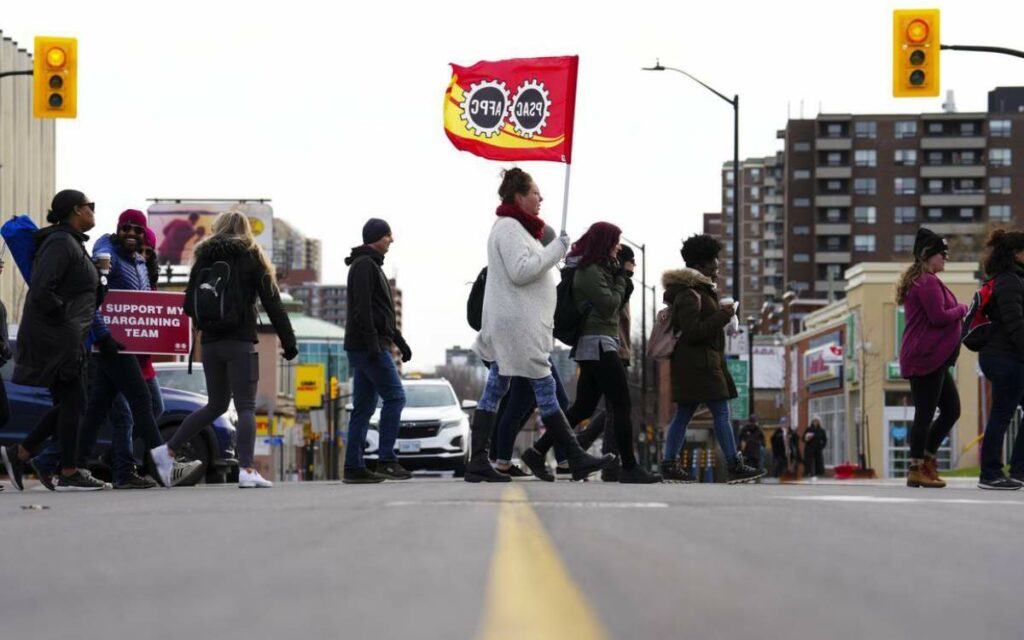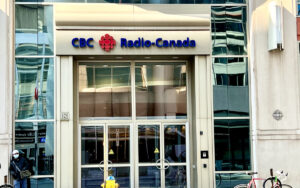
Just as the trucker convoy protestors who halted the movement of goods and people at international border crossings last year did not have the right to do what they did, PSAC workers do not have the right to disrupt economic activity by striking at ports of entry. Photo credit: The Canadian Press/Sean Kilpatrick
The federal public service strike is nearing the two-week mark. At this juncture, the Public Service Alliance of Canada (PSAC) and the Trudeau government seem no closer to reaching a deal than they did last week. Short of back to work legislation being tabled or the government offering major concessions, Canadians can expect the strike to drag on for the foreseeable future.
As PSAC tells it, the federal government isn’t bargaining in good faith. The accusation stands in contrast to the fact that the government has offered a 9 per cent wage increase that would provide the average public servant with an extra $6,250.
With PSAC so far refusing to accept the deal on the table, the government has referred to their demands as “unreasonable and unaffordable.”
So here we are. During the course of the last week and a half, striking workers have taken their message to the streets, creating picket lines at government buildings in and around the downtown core of Ottawa. But these impacts aren’t just being felt in the nation’s capital. Canadians have been told that federal services like passport applications and renewals will be delayed, and across the country, ports and airports have been put on notice to expect disruptions as a result of the strike action.
How PSAC can argue the federal government isn’t bargaining in good faith when they themselves are making threats of severe consequence to economic activity is questionable at best.
For astute political observers, this probably sounds all too familiar to the ‘freedom’ protests of last winter when the trucker convoy pulled similar stunts to hold critical infrastructure hostage. One could say they were successful in their endeavors to disrupt the movement of people and goods given the protest is estimated to have brought a halt to nearly four billion dollars in trade activity. The blockades were rightly met with a sharp rebuke from the Canadian public and government alike.
The comparison between the trucker convoy protests and the public service strike isn’t apples to apples. The government had no obligation to meet with the convoy, and they didn’t. In the case of the strike, the government is at the table and attempting to bring about a resolution. After dealing with the blowback of service backlogs last year, they have at least wised up to the fact that Canadians’ appetite to deal with more of the same is limited at best.
Public servants have the right to strike, but under no circumstances is it permissible to disrupt economic activity and strike at ports of entry, and they are doing a disservice to their own message if they choose to disrupt the flow of goods and people.
If PSAC makes good on their threats, they deserve to face the same criticism that the trucking convoy was subjected to for their actions at the Canadian border. And just as in the case of the trucker protest, the Prime Minister should be held to account to ensure that Canada’s infrastructure is protected from all groups who seek to disrupt our economy, be it public servants on strike, disgruntled Canadians, or political groups with a self-serving agenda.

Josie Sabatino is a Senior Consultant at Summa Strategies, focused on providing strategic insight and helping clients meet their objectives in an ever changing and complex political and regulatory environment. Prior to joining Summa, Josie spent nearly a decade in political communications and most recently served as the Director of Communications to the Hon. Erin O’Toole, former Leader of the Official Opposition.




















